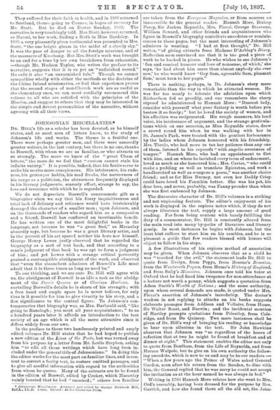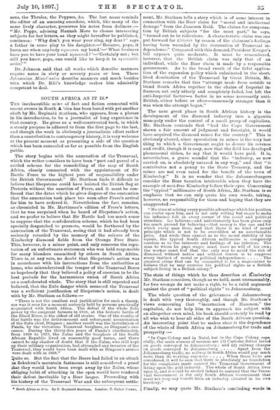JOHNSONIAN MISCELLANIES. * DR. HILL'S life as a scholar has been
devoted, as he himself states, and as most men of letters know, to the study of Johnson's life and works. The theme is a fruitful one. There were perhaps greater men, and there were assuredly greater writers, in the last century, but there is no one, thanks to Boswell, with whom we are so familiar, or who attracts us so strongly. The more we know of the "great Cham of letters," the more do we feel that "custom cannot stale his infinite variety." It is possible, indeed, that his faults serve to make his merits more conspicuous. His intolerance, his rude. nese, his grotesque habits, his mad freaks, the narrowness of his range as a politician, the obtuseness frequently displayed in his literary judgments, scarcely affect, strange to say, the love and reverence with which he is regarded.
We do not depreciate Boswell's consummate gift as a biographer when we say that his fussy inquisitiveness and total lack of delicacy and reticence would have irretrievably damaged the character of a smaller man ; upon Johnson, and on the thousands of readers who regard him as a companion and a friend, Boswell has conferred an inestimable benefit. He has written one of the most delightful books in the language, not because he was "a great fool," as Macaulay absurdly says, but because he was a great literary artist, and in the pursuit of his art spared neither his hero nor himself. George Henry Lewes justly observed that he regarded the biography as a sort of test book, and that according to a man's judgment of that book he was apt to form a judgment of him ; and yet Lewes with a strange critical perversity praised a contemptible abridgment of the work, and observed that "even the staunchest admirers of Boswell's Life must admit that it is three times as long as need be."
To our thinking, and we are sure Dr. Hill will agree with us, the abridgment of Boswell is as idle a task as the abridg- ment of the Faerie Queens or of Clarissa Hal-lc:we. In curtailing Boswell's details he is shorn of his strength ; with a free hand and ample space he is never tedious, for only thus is it possible for him to give vivacity to his story, and a due significance to the central figure. To Johnson's con- temporaries that biography was, as Mrs. Barbauld said, "like going to Ranelagh ; you meet all your acquaintance;" to us a hundred years later it affords an introduction to the best society of an age which is all the more attractive since it differs widely from our own.
In the preface to these two handsomely printed and amply edited volumes Dr. Hill states that he had hoped to publish a new edition of the Lives of the Poets, but was turned away from his purpose by a letter from Mr. Leslie Stephen, asking him "to edit all those writings which have long been in- cluded under the general title of Johnsoniana." In doing this the editor works for the most part on familiar lines, and is con- tent to correct a faulty text, to restore omitted passages, and to give all needful information with regard to the authorities from whom he quotes. Many of the extracts are to be found in the edition of Boswell, edited by Croker, which Macaulay vainly boasted that he had " smashed ; " others leas familiar • Johnsonian Misceltanies. Arranged and edited by George Birkbeck D.0.14, LL.D. 2 vole. Oxford: At the Clarendon Prem, are taken from the European Magazine, or from sources as inaccessible to the general reader. Hannah More, Bishop Percy, Sir Joshua Reynolds, Mrs. Piozzi, George Steevens, William Seward, and other friends and acquaintances who figure in Boswell's biography contribute anecdotes or reminis- cences to these pages, but the most interesting of Johnson's admirers is wanting. "I had at first thought," Dr. Hill writes, "of giving extracts from Madame D'Arblay's Diary. Reflection soon convinced me that it is too good a piece of work to be backed in pieces. He who wishes to see Johnson's fun and comical humour and love of nonsense, of which,' she says, he had about him more than almost anybody she ever saw,' he who would know Gay Sam, agreeable Sam, pleasant Sam,' must turn to her pages."
There is nothing, perhaps, in Dr. Johnson's story more remarkable than the way in which he attracted women. He was far too manly to tolerate the adulation upon which Richardson fed so greedily, and one remembers the sharp reproof he administered to Hannah More : "Dearest lady, consider with yourself what your flattery is worth before you bestow it so freely;" but he loved the society of women, and his affection was reciprocated. His rough manners, his loud voice, his intolerance of argument, and the strange gesticula- tions which on one occasion, as Miss Reynolds states, drew a crowd round him when he was walking with her in St. James's Park, were treated with the gentlest forbearance by the ladies whom Johnson honoured with his friendship. Mrs. Thrale, who had more to tax her patience than any one of them, listened to his reproofs "with angelic sweetness of temper." Hannah More, who had an appointment to flirt with him, and on whom he lavished every term of endearment, loved as much as she honoured him ; Mrs. Carter, "who could make a pudding as well as translate Epictetus, and work a handkerchief as well as compose a poem," was another choice friend ; and as for Miss Burney, not even her Daddy Crisp could have loved his Fannikin better. She was his pet, his dear love, and never, probably, was Fanny prouder than when she was first embraced by Johnson.
The discursive character of Dr. Hill's volumes is a striking and not unpleasing feature. The editor's enjoyment of his work is displayed in the copious notes which, if they do not always illustrate the text, supply a large amount of good reading. Far from being content with barely fulfilling the duty of a commentator, Dr. Hill is constantly allured from the main road into many by-paths of literature and literary gossip. In most instances he begins with Johnson, but the least hint suffices to start him on his rambles, and he is so pleasant a guide that few readers blessed with leisure will object to follow in his steps.
A few illustrations of his copious method of annotation may be given. When Johnson observes that as a child he was "touched for the evil," the statement leads Dr. Hill to quote from Evelyn, from Pepys, from Hearne's Remains, from the Wentworth Papers, from Hume's History of England, and from Sully's Menzoires. Johnson once told his tutor at Oxford that he had fined him twopence for non-attendance at a lecture not worth a penny, which suggests a quotation from Adam Smith's Wealth of Nations ; and the same authority, upon whom several demands are made, is quoted under Mrs. Piozzi's assertion of Johnson's incredulity. The doctor's wisdom in not replying to attacks on his books suggests elaborate passages from Addison and Voltaire, from Hume, Sir Walter Scott, and Darwin ; and the incidental mention of Hartley prompts quotations from Priestley, from Cole- ridge, and from De Quincey. Two more instances shall be given of Dr. Hill's way of bringing his reading or knowledge to bear upon allusions in the text. Sir John Hawkins observes that Johnson was "so regardless of the hours at refection that at two he might be found at breakfast and at dinner at eight." This statement enables the editor not only to quote from Bentham, from the Life of Reynolds, and from Horace Walpole, but to give on his own authority the follow- ing anecdote, which is new to us and may be to our readers :— " When a few years ago the Prince of Wales asked General Gordon, soon after his return from the Soudan, to dine with him, the General replied that he was sorry he could not accept the invitation as at the hour named he was always in bed."
Writing in 1780 Hannah More relates how she went to Mrs. Ord's assembly, having been dressed for the purpose by Mrs. Garrick, and how she found there all the old set, the John. sons, the Thrales, the Pepyses, &a. The last name reminds the editor of an amusing anecdote, which, like many of the same lively character, preserves his notes from dullness :— "Mr. Pepys, advising Hannah More to choose interesting subjects for her letters, as they might hereafter be published, continues : Why don't you wear your ring, my dear P' says a father in some play to his daughter.—' Because, papa, it hurts me when anybody squeezes my hand.'—' What business have you to have your band squeezed ? Certainly not ; but still you know, papa, one would like to keep it in squeezable order.'" Dr. Johnson said that all works which describe manners require notes in sixty or seventy years or less. These Johnsonian MjsceUanjes describe manners and much besides with which Dr. Hill's knowledge makes him admirably competent to deal.



































 Previous page
Previous page